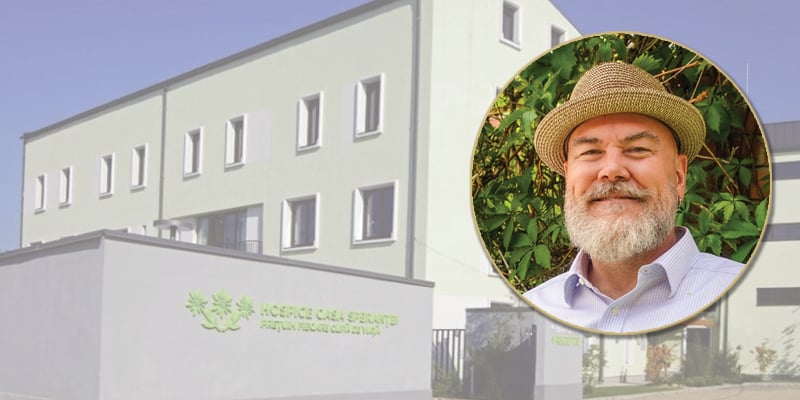Dr. Sean Reed didn’t believe what he was reading in his office at the University of Colorado College of Nursing at Anschutz Medical Campus one day in mid-May. He had been waiting for months to hear “yes” or “no”.
The assistant professor had to read a letter twice from the Fulbright Program to fully understand what it said. And even then, he still didn’t believe it.
He’d been granted a Fulbright Research Fellowship.
“I went over to Dr. Kathy Jankowski’s office and asked if she could read it to make sure what I was reading was true,” he says. “We were jumping up and down, and we were so excited.”
The Fulbright Research Fellowship allows Reed to travel to Romania for the upcoming Fall 2025 semester. His research focuses on improving palliative care and addressing healthcare inequities by using a tool he developed to improve resource allocation.
Palliative care provides care for people living with serious illnesses to improve quality of life and reduce stress from the illness. This type of care meets the patient’s needs at any stage in their illness.
What is a Fulbright Scholar?Fulbright Scholars engage in cutting-edge research and expand their professional networks, often continuing research collaborations started abroad and laying the groundwork for forging future partnerships between institutions, labs, and classrooms, they share their stories and often become active supporters of international exchange, inviting foreign scholars to campus and encouraging colleagues and students to go abroad. Since 1946, the Fulbright program has provided more than 400,000 participants from over 160 countries – chosen for their academic merit and leadership potential – with the opportunity to exchange ideas and contribute to finding solutions to challenges facing our communities and our world. |
Reed will work with Romania’s leading palliative care provider near the country’s capital of Bucharest, bringing innovative approaches to their healthcare system while learning about their strengths and challenges.
“By working with healthcare providers and leadership, we will implement and culturally adapt my patient prioritization tool to fit Romania's healthcare system and measure how it affects resource distribution, care quality, and patient outcomes," he says, adding that in Romania, only 18.7% of the population has access to palliative care services.
“The Fulbright is more than a personal achievement; it's an opportunity to forge meaningful international partnerships that can transform care delivery for seriously ill patients globally,” he adds.
A Critical Tool
Reed developed the tool a few years ago to identify which patients needed immediate attention versus those who could wait. He realized more resources were being used for stable patients, instead of patients who needed help immediately.
Reed was approached by SANAD Home Hospice in Lebanon for consultation on improving their workflow and outcomes. Following the consultation, SANAD adapted his tool to fit their organization. During implementation, both leadership and nurses found it to be a valuable aid. Once in use, the tool enhanced efficiency and supported nurses in managing their patient loads more effectively.
"I shared a staffing approach based on patient needs that helped them make the best use of their resources while enhancing care quality," Reed says. "Despite limited resources, they saw significant improvements in caregiver satisfaction, particularly in spiritual support."
The tool gained even more traction (including adoption by other palliative and hospice organizations), and HOSPICE Casa Speranței in Romania reached out to Reed last summer to learn more about it. He spent a few weeks there as a visiting scholar, observing home visits and operations, and gaining a deeper understanding of the local healthcare system.
“This is about caring for the human being. This isn’t about money, economics, or politics. This is about providing the right care to the right person at the right time in the right setting.”
"When I mentioned my visiting scholar invitation to Romania during my comprehensive review, CU Nursing Dean Elias Provencio-Vasquez, PhD, RN, FAAN, FAANP, immediately saw its potential beyond just the experience itself and encouraged me to pursue the Fulbright award. His strategic mentorship helped transform what began as a scholarly visit into this prestigious fellowship opportunity,” Reed says.
“This Fulbright provides an opportunity to study the implementation of a tool designed to support resource decisions based on patient acuity and needs,” Reed says. “It also allows me to learn from a system where hospice and palliative care services are integrated, offering a more continuous and holistic approach to serious illness than is typical in the U.S.”

HOSPICE Casa Speranței in Romania, where Sean Reed will conduct research. |
When Reed is in Romania, he and other providers will receive feedback on how the tool is working and analyze what’s working and what isn’t. Since Reed is using something developed for a US healthcare system, one main goal will be to understand what needs to change so the tool can be implemented cross-culturally, similar to what happened when it was used in Lebanon.
“I won’t know what needs to change until I’m there,” he says, “but I’ll work with providers in Romania to adapt it to fit their healthcare system. It’s so gratifying to see this tool that has so many uses being used to give the right care to the right person at the right time,” he says. “Ultimately, this is about strengthening the capacity to provide palliative care when it’s most needed.”
Reed says what’s important about improving a healthcare system, patient care, and nurses’ ability to treat patients is that everyone, globally, is facing the same problem: all healthcare systems are facing a lack of appropriate and sustainable resources to address patients’ needs.
What’s Next?
“We’re planning to present our findings on an international stage,” Reed says. “The European Association for Palliative Care is an excellent stage to disseminate our new knowledge.” |
“We may not have the secret solution to fix everything, but if this tool helps address even a little bit of the problem from a global, human-centered perspective, that’s incredibly meaningful to me,” he says.
A Passion for Palliative Care
Reed is one of the few CU Nursing faculty members to be named a Fulbright Scholar, along with CU Nursing Living Legend Jean Watson, former faculty member Marie Hastings-Tolosma, and, more recently, Associate Professor Christina Sun.
He earned all his degrees from CU Nursing, first coming to the college as a first-generation college student in his 30s after a career in business. Reed realized he wanted to do something focused on humanity and became a massage therapist. While working with spinal cord injury patients at Craig Hospital, he was drawn to nursing.
“I made the decision to become a nurse, and I realized there wasn’t much curriculum for end-of-life care during my undergrad,” he says.
He had clinicals in palliative care and hospice settings, and knew he wanted to make sure patients and their families at the end of life had “something to remember instead of something to forget”.
He says the mentorship and education he received at CU Nursing shaped his path to a career in academia and palliative care.
“Receiving this Fulbright Fellowship feels like bringing my journey full circle. CU Nursing instilled in me the importance of theory-guided, evidence-based practice, health equity, and global perspectives; these values that directly inform my Fulbright research,” he says.


